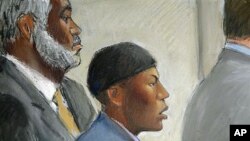Nigerian Umar Farouk Abdulmutallab has pleaded guilty to trying to blow up an American airliner on Christmas Day in 2009, in what became known as the "underwear bomb" plot. Abdulmutallab agreed to the plea on Wednesday, at the beginning of the second day of testimony in his trial in Detroit, Michigan.
Abdulmutallab admitted to all of the eight charges against him for carrying out the failed December 25, 2009 attack on a flight from Amsterdam to Detroit.
On Wednesday, he told the judge in a U.S. District Court that by participating in jihad against the United States, he was fulfilling his religious duty and avenging the deaths of innocent Muslims killed in Yemen, Afghanistan and elsewhere.
Benjamin Wittes, a senior fellow at the Brookings Institution in Washington, said Abdulmutallab's decision to plead guilty is not that surprising. Wittes says that like other accused terrorists, Abdulmutallab sees the courtroom as a propaganda tool.
"If you're someone who the government has rip-roaringly good evidence against, and this is a case in which there really is no doubt about what Abdulmutallab did or what he tried to do and how he tried to do it," said Wittes. "There were statements that were going to be admitted against him. There were lots of people who saw it. And so the argument for claiming credit for it, wrapping yourself in it, is pretty good."
In the run-up to the trial, Abdulmutallab made several outbursts in court, proclaiming allegiance to al-Qaida and claiming that Yemen-based radical cleric Anwar al-Awlaki is still alive. The American-born Awlaki was killed last month in Yemen by a U.S. airstrike.
The prosecution spent the first day of the trial on Tuesday outlining a wide range of evidence and witnesses in the case. Prosecutor Jonathan Tukel argued that Abdulmutallab wanted to achieve martyrdom and was on the flight for one reason - to kill all 290 people on board, including himself, as part of an al-Qaida mission.
Tukel told the court that Abdulmutallab incriminated himself by telling passengers, crew members, and U.S. authorities on the ground that he had tried to blow up the plane on behalf of al-Qaida.
Douglas McNabb, senior principal with the law firm McNabb and Associates, said the guilty plea brings to a close what could have been a very difficult case for the defense.
"After being in a United States federal courtroom, seeing the judge, seeing the jury, the seriousness of the matter, what his potential exposure is if he's convicted," said McNabb. "And of course the allegations are that he confessed. I think he might have finally come to the realization that he's making a mistake by going forward with the trial and representing himself."
McNabb said the case was unusual in many ways - in addition to the fact that it ended on only the second day of trial.
Abdulmutallab was acting as his own lawyer, but relying on a court-appointed standby attorney to handle much of the courtroom work.
Abdulmutallab faces life in prison. He is expected to be sentenced in January.
Nigerian Man Pleads Guilty in 'Underwear Bomb' Plot
- By Bill Ide




